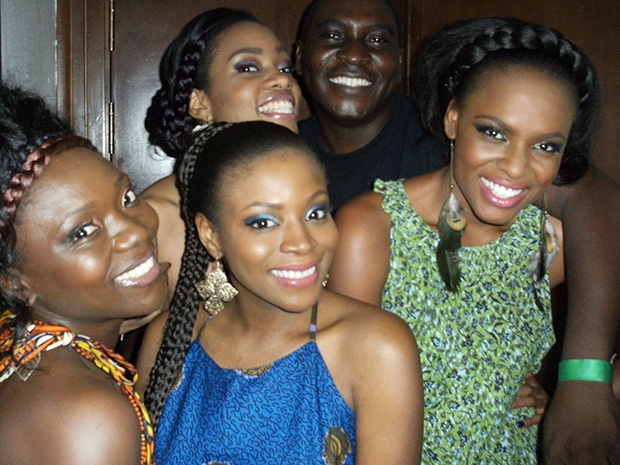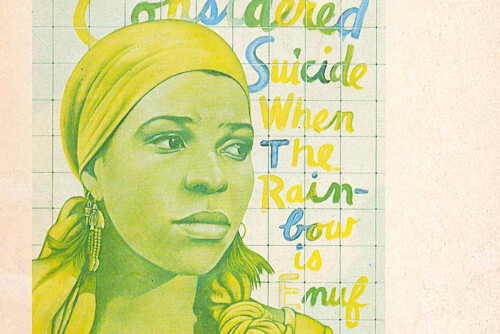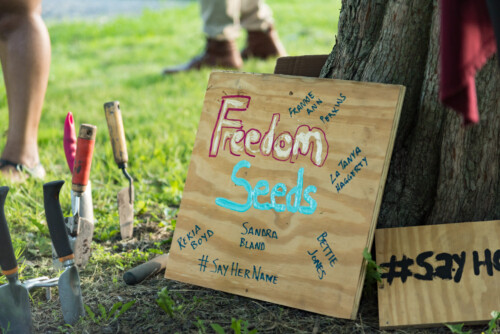Playwright-director Wole Oguntokun has been a major figure in contemporary Nigerian theater for over 15 years. As the artistic director of the Renegade Theatre, he directed groundbreaking productions, including a Yoruba version of The Winter’s Tale in London’s Globe theater as part of the Shakespeare Olympiad. He became the first Nigerian producer and director to present a play at the Edinburgh Fringe Festival, where he directed his own piece, The Waiting Room.
Oguntokun has directed a broad repertoire of works, including his own plays: Who’s Afraid of Wole Soyinka (2002), The Inheritors (2003), The Other Side (2005), The Tarzan Monologues (2009), The Waiting Room (2010, 2011), Ajai (2010 and 2012), and Eni Ogun (2013). He has also directed works by other Nigerian writers, including Wole Soyinka, Femi Osofisan, and Ola Rotimi, and works by non-Nigerian playwrights such as Eve Ensler and Athol Fugard. He was also founding artistic director and producer of the Theatre@Terra project in Lagos. Oguntokun obtained master’s degrees in both law and humanitarian refugee studies at the University of Lagos and has been called to the Nigerian bar.
Oguntokun directed the first Nigerian production of for colored girls, which premiered in December of 2011 at Shell Hall, Muson Centre, in Lagos. Producer Keke Hammond proclaimed that the play “presents an opportunity for the Nigerian woman to see her struggles through the lives of other women and also to birth a conviction within her to stand up for their rights.” She and Oguntokun reprised the production in June 2014. This interview was conducted via Skype on September 18, 2013 while Oguntokun was in Lagos and Cynn was in Richmond, VA, and later via email.

Chris Cynn: The 2011 production of for colored girls seems to be so specifically American in its urban geography and it seems to be responding to such a specifically US feminist, a white feminist, anti-Vietnam War, Black Arts Movement of the 1970s. But you and Keke Hammond presumably saw this play as being particularly relevant in addressing some of these issues that you identify as specifically Nigerian. What about this play made you feel like it would be a suitable, relevant response to some of those issues?
Wole Oguntokun: Roughly speaking, it was still the case of women speaking up, speaking out against subjugation. It [the American context] didn’t matter. The language was a bit dense because it was language peculiar to a particular section of the American community: black females. But we saw that the problems, the obstacles that women face around the world are usually the same. From the man who beats a woman, who holds a woman in check through physical force, from the man who puts a woman down … to the woman who seeks to free her spirit and seeks to find liberation. The stories are the same.
I directed The Vagina Monologues here once, too. 1 In Nigeria, The V Monologues was not just about the woman being the underdog. It’s a woman herself, in search of her identity. It’s not just about a woman being the underdog all the time. It’s a woman herself, in search of her place in the world, of where she stands in the scheme of things. for colored girls openly confronts the complexities intertwined with being colored and being a woman at the same time, two “weaknesses” in a global system that is rigged against them. There are certain disadvantages that come from being a woman, that come with being black, even in the twenty-first century, and it is a brave person that marches on towards the rainbow in spite of these obstacles.
So basically, even though [for colored girls] was American, it still struck a chord with us here. It was a story of women trying to find themselves again, which was why we thought it would be a good story here. Also, the movie was very popular here as well. It was about everything. The story cut across humanity, basically, because they were true stories. There was no geographical lock on those stories. It was not work that only stayed between the boundaries of America and wouldn’t travel. Those stories were real to us here.
Chris Cynn: You mentioned The V Monologues adaptation of Eve Ensler’s work. And you also did the Yoruba production of Shakespeare’s The Winter’s Tale, where you did a more literal translation of the actual language. 2 I wonder what kind of specific adaptations you felt you needed to make to [for colored girls] to make it resonate more with Nigerian audiences? Or did you really leave the script intact? How did you translate some of that idiomatic American language, or did you not?
Wole Oguntokun: The language would have been incomprehensible to the Nigerian audience if left as it was. I suppose the language would have been incomprehensible to a lot of Americans as well. It was heavy going. When I first came across it, it was like reading Shakespeare. Sometimes, in these things, you have to look for the meaning behind it. You try to adapt speech without losing the meaning and the essence of the language. When we began to rehearse the play, we had to translate it into everyday usage here.
I think that the average Nigerian speaks regular English, not English peculiar to a certain geography at a certain period in American history. The average Nigerian speaks English, but we had to bring her language into the parlance that we use here, into the idioms that are peculiar to us. There were some things that were really, really obscure in the script, and we had to look for the given circumstances in the play and the things that prompted that kind of language; what the language meant when Ntozake wrote her story.
Chris Cynn: Can you give me an example? In her play, [Shange] seems to be affirming a black diaspora, and in her prologue, she writes that “everything … African was mine.” 3 Did you allude to that context, for example, to Toussaint L’Ouverture and Haiti in your production? Did you refer to a lot of the Caribbean context, the music, the dance?
Wole Oguntokun: No, in many ways we couldn’t. For example, we couldn’t use the music because it would have had no anchors here. Even the dance was translated to an African dance. The woman who went to the nightclubs, who she said she loved to dance, she loved to party … We had to translate that character into something people would recognize here. It would have been a bit difficult trying to dance as she does. It would be like doing the tango. That’s not normal to us here. It’s not an everyday thing, and people might have thought it was pretentious if we had tried to do that; basically because it’s not us. For example, the young woman who ran away from home and said she had found a hero; she went in search of a hero. What was her name?
Chris Cynn: The lady in brown, who was looking for Toussaint L’Ouverture, the Haitian revolutionary hero.
Wole Oguntokun: Yes, it was her. What we used was someone I would have considered a hero here … the name I used was someone worthy of emulation. It was our Nobel Laureate, Professor Wole Soyinka.
So it would have been, I think, a bit—not a bit—it would have been highly pretentious to have attempted to keep the story as it was, completely. We kept the essence of the play, but the anchors were peculiar to us, in this part of the world. The anchors that people here would see and immediately engage with. They think: okay, we all understand this. We understand this dance. We understand her need to want to break free, to want to get rid of her stress and her troubles. And to say she’s going to go to a party and she’s going to dance and she’s going to set her spirit free.
Some things didn’t need any touching up. The girl who said she was tired of hearing “I’m sorry” from a man who put her down all the time. She said she had had “sorry” up to here. That’s universal; that’s a story that all women and all men would understand. If you go to a woman and tell her “sorry” all the time and she says, “look, I’ve had enough, you know where to put your sorry.” That kind of thing doesn’t need any touching up. Other things had to be drawn into the African context, into the Nigerian context.
Chris Cynn: And how did audiences respond to your production?
Wole Oguntokun: I’m going to—totally without any attempt at modesty—say they enjoyed it. I believe they enjoyed it. I believe they appreciated it. We had to be careful because in the pursuit of wanting to put up this American piece, so to say, we had to find the humanity in it. We had to maintain the connection that the African would have to it.
There are a lot of stories out there that an African might say—you know, this has nothing to do with me; this thing doesn’t reflect hunger, it doesn’t reflect lack or penury. And so, you can’t tell my story if you haven’t felt my pain. So we had to hold on to the strain in the story because it really was a universal thing, really, most of it. The language wasn’t—I didn’t grow up in America in the ’70s. Even though the language was very strong in many places, I think we kept the essence of it, and therefore, the audience was able to appreciate what we had done.
Chris Cynn: The play seems to, and it’s well known on this side anyway, for asserting a new black feminist dramatic idiom because it incorporates the dance, the movement, the speech, the music in really—at the time, especially, right?—new and radical ways. Did you feel like your audiences really appreciated it? How did you do the choreography?
Wole Oguntokun: Yes, I did the choreography here. It wasn’t all dance. For example, there were only specific pieces that had the dance theme in there. There was music because we had a drummer on set throughout the play. There was music and there was some dance, but it wasn’t because I wanted to keep in tandem with a particular movement in the world. It was because for me, stories get told better sometimes when there’s music and there’s dance. There was no, how do you say—highfalutin’ ambition behind that.
Chris Cynn: You said that audiences were familiar with Shange’s for colored girls because of the Tyler Perry movie. Are other Nigerian writers influenced by her work? Are they familiar with any of her other work? Or had they known her before the film, do you think? Do you think the general Nigerian public had known about Shange before the Perry film?
Wole Oguntokun: No, I do not think her work was very popular with the average Nigerian here before Tyler Perry made a movie out of it … I didn’t see the movie until after I had done the play. But when the movie came in here, it had a large impact, I think, in pushing her name and that particular work into the faces of people. A great work, but it hadn’t gotten around here before the movie.
Chris Cynn: Do you think other writers or other artists are familiar with her work, more so than the general public?
Wole Oguntokun: I’m sure the literati, I’m sure writers and people with artistic leanings, knew who Ntozake Shange was before the film. But for the average Nigerian, I think cable TV and that movie helped it a bit. I think it was the movie that brought it to their consciousness.
Chris Cynn: And how about for you? I’m just wondering for you personally—you mentioned Soyinka. You’re also well known for having directed a lot of his work. So how would you situate this production, the Shange production, in the context of your other work in terms of your political activism/transformation, as well as your larger artistic projects?
Wole Oguntokun: Yes. Okay. As I said, in 2007, I was asked to do an adaptation of Eve Ensler’s Vagina Monologues here, and so I selected four other female writers and we did. We wrote something for Nigeria and called it The V Monologues. And I was also the first director of The V Monologues here…. So basically, I would think for colored girls would be in the same category with [V Monologues] because … it’s basically about raising the consciousness of women here.
When I saw The Vagina Monologues myself, it was really … it was life-changing. I had never seen these sorts of women, women just speaking of their essence, saying words, calling things that you wouldn’t think polite society would allow.
That was The Vagina Monologues. So when we did the rewrite of The V Monologues, we had to do the rewrite because people, a lot of Nigerians felt the language was a bit too strong here. I don’t know if it’s hypocrisy but you can’t use some words in public here. So that forced the rewrite. And then, The V Monologues still had to be made, it had to be made suitable. It had to be based on stories, and Nigerians told of the things that had happened to them through interviews undertaken by the Kudirat Initiative for Democracy (K.I.N.D.), 4 the organization that commissioned the rewrite, and the interviews spoke of things like women who had been passed to other men as gifts by their husbands. 5
So, I would say that for colored girls was a bit like that for me. It stands apart from a lot of the things I’ve done because it is geared primarily towards women. Basically, it doesn’t matter how you look at it; it is geared towards protecting women, their awareness, the way they see the world. Sometimes it appears to be man-hating. But it is geared towards telling women to speak up, stand out, and not be afraid to express themselves.
Chris Cynn: Is that a criticism that was leveled there against the play? That it’s man-hating? That’s a term that circulated around here.
Wole Oguntokun: No, no, no. Okay. What I said actually was—sometimes it appears man-hating. It appears. It has a semblance because it speaks so much against the wrongs done. It has a semblance of being man-hating … and some men spoke about that, and even some women too, in their feedback, that this is just anti-man, and all that. I suppose it’s an irony that a man directed it here.
- See footnote 8 in Kaigwa’s interview, this issue.[↑]
- In May 2012, Oguntokun adapted and directed a Yoruba adaptation of The Winter’s Tale at the Globe Theatre in London, England. For a recorded interview with Oguntokun talking about the adaptation, see http://globetoglobe.shakespearesglobe.com/archive/2012/plays/the-winters-tale/interview.[↑]
- Ntozake Shange, for colored girls who have considered suicide / when the rainbow is enuf (New York: Macmillan, 1977) xi.[↑]
- A Nigerian nongovernmental organization based in Lagos that, according to its vision statement, works “to strengthen organizations and create initiatives dedicated to the advancement of women. Our work is primarily in Nigeria in the areas of leadership development for young women and on collaborative projects aimed at removing barriers to public participation of women and ending violence against women.” See http://www.kind.org/version3/about.php?id=4.[↑]
- Oguntokun wrote the Nigerian adaption of The Vagina Monologues, The V Monologues, as well as a male version of the play that was incorporated into the V Monologues in a production, The Ultimate Face-Off: V-Monologues v. Tarzan Monologues, that he directed in March 2010. See http://pridenigeria.com/spotlight/wole-oguntokun/.[↑]



